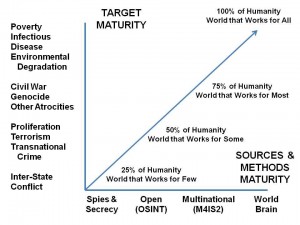
Reasoning by analogy is powerful, but dangerous for of thinking. Einstein, for example, showed how reasoning by analogy can unleash stunning insights , but only when properly tempered by critical observation, testing, and systematic analysis, can analogical insights lead to brilliant syntheses that literally change our view of reality.
But that benefit comes with a heavy price, because this kind of reasoning is also a very dangerous way to think. Analogies can capture the imagination and thereby bias the Orientation of less disciplined thinkers and decision makers to distort and twist their Observations into a vision of reality the Observer/Decision Maker wants to see. In so doing, the distorted Orientation takes decision maker off the cliff by disconnecting his Actions from the real world. And … for every Einstein with a highly disciplined Observation – Orientation – Decision Action loop, there are thousands of crackpots, nutcases, and charlatans trying to sell their visions of “what is” to sell their pre-concieved views of appropriate decisions and actions of action.
In the below essay, Richard Falk offers a good example of reasoning by analogy done properly. He carefully crafts and explains a limited set of parallels between the January 1968 Tet Offensive in Viet Nam to Obama's dilemma in Afghanistan. CS
The Tet Offensive's parallels to Afghanistan
The United States should learn from mistakes it made during the Vietnam War and withdraw from Afghanistan.
EXTRACTS:
Continue reading “Chuck Spinney: Richard Falk on USG Learning Disability”






